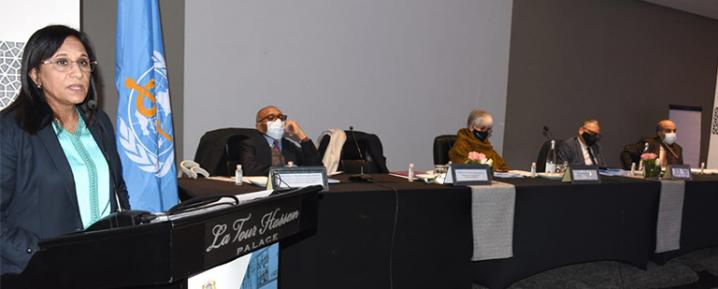Challenges of inclusive education can only be overcome through an integrated approach based on human rights and the principle of participation

The President of the National Human Rights Council (CNDH), Mrs. Amina Bouayach, announced that the Council has a stake in the principle of participation through training and awareness-raising workshops on the rights of children with disabilities to implement best practices on the rights of children with disabilities, pursuant the Convention on the Rights of the Child and the Convention on the Rights of Persons with Disabilities and based on suggestions and perceptions of children with disabilities.
This announcement is part of the CNDH Chairperson statement on the occasion of the opening session of training and awareness-raising workshops on the rights of children with disabilities as part of the United Nations Partnership on the Rights of Persons with Disabilities "Changing mindsets and instilling human rights approach in the perception of disabilities in Morocco." This opening session was organized by the CNDH and the World Health Organization (WHO) on Monday 15 February 2021 in Rabat, Morocco.
Mrs. Bouayach also stressed that the ambition of the CNDH and its partners is to provide necessary conditions for establishing protective systems for children with disabilities through these workshops.
The CNDH Chairperson stated that these workshops are to be an ethical commitment aiming at creating a space for expression and participation of children with disabilities.
These workshops will be organized in Rabat between 15 and 19 February 2021 and then in Casablanca between 22 and 26 February 2021, in partnership with health professionals, education professionals, NGOs, students and parents’ associations.
In the same context, Mrs. Bouayach indicated that the challenges related to inclusive education can only be overcome through an integrated approach based on human rights and the efforts of all stakeholders to consider the children's opinion.
For her part, WHO representative in Morocco, Mrs. Maryam Bigdeli, pointed out that the WHO considers disability as a global public health issue and a human rights issue. It deserves priority in any development program, she added. Mrs. Bigdeli also noted the commitment and efforts made to ensure the effectiveness of inclusive education within the framework of a human rights approach and to provide quality health services for children with disabilities in Morocco.
In the same context, Mr. Fouad Chafiki, Director of Curricula at the Ministry of National Education, Vocational Training, Higher Education and Scientific Research, Morocco, announced the Ministry's decision to convert about 14,000 public educational institutions into integrated institutions by programming 10% of schools every year to this purpose. He also announced the decision to include sign language in the remote lessons broadcasted by the Ministry on television to enable deaf pupils to attend these lessons.
As for Mr. Abdelmajid Sahnoun, Ministry of Health representative, he called on all participants in this ambitious program to double their efforts, especially in this Covid-19 pandemic circumstance, to take care of persons with disabilities, particularly, to mitigate the side effects of this crisis on children with disabilities.
These training and awareness-raising workshops target students, parents' associations, education professionals and health professionals. They are organized based on an interactive and participatory approach by adopting techniques and tools compatible with various forms of disability.
The first session of each workshop will focus on the concepts and main points of the principles of the Convention on the Rights of the Child and the national complaints mechanism for children. The second session will be devoted to the general principles and the independent mechanism for protecting the rights of persons with disabilities.






















